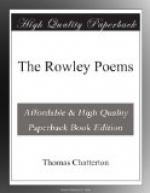In July 1765, that is to say when the boy was aged about 13, the authorities of Colston’s Hospital apprenticed him to John Lambert, a Bristol attorney. He had chosen the calling himself, but it was not long before the life became intolerable to him. It was arranged that he should board with Lambert, and the attorney made him share a bedroom with the foot-boy and eat his meals in the kitchen. Further, though his sister has recorded that the work was light, the practice being inconsiderable, Lambert always tore up any writing of Chatterton’s that he could find if it did not relate to his business. ‘Your stuff!’ he would say. Nevertheless he admitted that his apprentice was always to be found at his desk, for he often sent the footman in to see. And no doubt on some of these occasions Chatterton was copying the legal precedents of which 370 folio pages, neatly written in a well-formed handwriting, remain to this day as evidence of legitimate industry. At other times he was certainly composing poems by Rowley.
Perhaps at this point it would be well to give some account of Chatterton’s method in the production of ancient writings. First it seems he wrote the matter in the ordinary English of his day. Then he would with the help of an English-Rowley and Rowley-English Dictionary (which he had laboriously compiled for himself out of the vocabulary to Speght’s Chaucer, Bailey’s Universal Etymological Dictionary, and Kersey’s Dictionarium Anglo-Britannicum) translate the work into what he probably thought was a very fair imitation of fifteenth century language. His spelling Professor Skeat characterizes as ’that debased kind which prevails in Chevy Chase and the Battle of Otterbourn in Percy’s Reliques, only a little more disguised.’ Percy’s Reliques were not published till 1765, but it is natural to suppose that Chatterton when he was ’wildly squandering all he got On books and learning and the Lord knows what,’ and thereby involving himself in some little debt, would have bought the volume very soon after its publication. Finally as to the production of ‘an original’. We have two accounts; one of which represents the pseudo-Rowley rubbing a parchment upon a dirty floor after smearing it with ochre and saying ‘that was the way to antiquate it’; the other, even more explicit, is the testimony of a local chemist, one Rudhall, who was for some time a close friend of Chatterton’s. The incident in which Rudhall appears is worth relating at length.
In the month of September 1768 an event of some importance occurred at Bristol—a new bridge that had been built across the Avon to supersede a structure dating from the reign of the second Henry being formally thrown open for traffic. At the time when this was the general talk of the city Chatterton had left with the editor of Felix Farley’s Bristol Journal a description of the ’Fryars passing over the Old Bridge taken from an ancient manuscript.’




